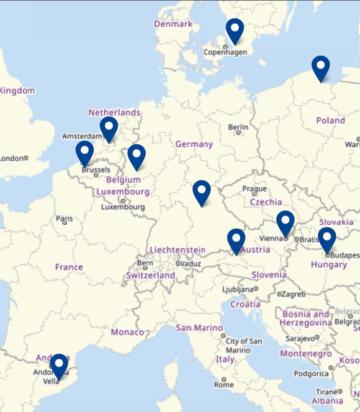Artikel 4 des Protokolls Nr. 7 zur EMRK lautet wie folgt:
`1. Niemand darf wegen einer Straftat, wegen der er bereits nach dem Gesetz und dem Strafverfahrensrecht eines Staates rechtskräftig verurteilt oder freigesprochen worden ist, in einem Strafverfahren desselben Staates erneut verfolgt oder bestraft werden.
2. Absatz 1 schließt die Wiederaufnahme des Verfahrens nach dem Gesetz und dem Strafverfahrensrecht des betreffenden Staates nicht aus, falls neue oder neu bekannt gewordene Tatsachen vorliegen oder das vorausgegangene Verfahren schwere, den Ausgang des Verfahrens berührende Mängel aufweist.
3. Von diesem Artikel darf nicht nach Artikel 15 der Konvention abgewichen werden.`
Die Regel `ne bis in idem` wird im Unionsrecht angewandt (siehe in der umfangreichen Rechtsprechung Urteil vom 5. Mai 1966, Rechtssachen 18/65 und 35/65, Gutmann gegen Kommission, Slg. 1966, 150, und in jüngerer Zeit Urteil des Gerichts erster Instanz vom 20. April 1999, verbundene Rechtssachen T-305/94 und andere, Limburgse Vinyl Maatschappij NV gegen Kommission, Slg. 1999, II-931). Es ist darauf hinzuweisen, dass die Regel des Verbots der Doppelbestrafung sich auf gleichartige Sanktionen, in diesem Fall durch ein Strafgericht verhängte Strafen, bezieht.
Nach Artikel 50 findet die Regel `ne bis in idem` nicht nur innerhalb der Gerichtsbarkeit eines Staates, sondern auch zwischen den Gerichtsbarkeiten mehrerer Mitgliedstaaten Anwendung. Dies entspricht dem Rechtsbesitzstand der Union; siehe die Artikel 54 bis 58 des Schengener Durchführungsübereinkommens und Urteil des Gerichtshofes vom 11. Februar 2003, Rechtssache C-187/01 Gözütok (Slg. 2003, I-1345), Artikel 7 des Übereinkommens über den Schutz der finanziellen Interessen der Europäischen Gemeinschaften sowie Artikel 10 des Übereinkommens über die Bekämpfung der Bestechung. Die klar eingegrenzten Ausnahmen, in denen die Mitgliedstaaten nach diesen Übereinkommen von der Regel `ne bis in idem` abweichen können, sind von der horizontalen Klausel des Artikels 52 Absatz 1 über die Einschränkungen abgedeckt. Was die in Artikel 4 des Protokolls Nr. 7 bezeichneten Fälle betrifft, nämlich die Anwendung des Grundsatzes in ein und demselben Mitgliedstaat, so hat das garantierte Recht dieselbe Bedeutung und dieselbe Tragweite wie das entsprechende Recht der EMRK.




